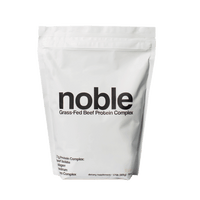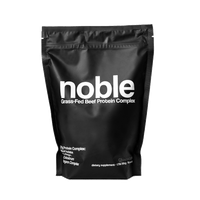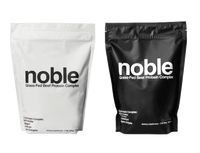
How Much Protein is in Beef Liver? (A Noble Superfood)
Share
Have you ever pondered the ancestral power packed within beef liver? You're not alone.
Many are awakening to the question: How much protein does beef liver truly offer?
The answer?
A staggering 20.35 grams of protein in just 100 grams of this nature's marvel! (1)
Journey with us as we unravel the profound nutritional tapestry of this organ meat, spotlighting its protein richness and the myriad health benefits it bestows.
Are you prepared to embrace the wisdom of this superfood legacy?
Key Takeaways
- Beef liver packs a lot of protein, around 20 to 30 grams per serving (100g).
- Besides protein, beef liver contains essential minerals like iron, zinc, and vitamins, including Vitamins A and B.
- Eating beef liver can lower the risk of anemia, help improve eyesight, and boost Vitamin B12 for brain function.
- You must store beef liver correctly in the refrigerator or freezer to keep it from spoiling.
Nutritional information of beef liver
Despite being an organ meat, beef liver is packed with essential nutrients that contribute to overall health.
The following table provides a detailed summary of the nutritional profile of beef liver based on a 100g serving.
| Nutrient | Amount |
|---|---|
| Calories | 135 |
| Protein | 23g |
| Copper | 9.8mg |
This table illustrates that beef liver is a significant source of protein and numerous vitamins and minerals, making it a vital addition to a balanced diet.
The Protein Content in Beef Liver
Beef liver is packed with a substantial amount of protein, offering about 20-30 grams per serving (100g), thus making it an excellent source of this essential nutrient.
Next to its high-protein content, beef liver stacks up more favorably than other meats within the same weight classification.
This section will thoroughly explore the impressive protein profile of beef liver and its comparison to other meats.
Comparison with Other Meats
When comparing the protein content of beef liver with other meats, beef liver comes out on top. Here is a table representation for better understanding:
| Meat | Protein Content per 100 grams |
|---|---|
| Beef Liver | 26.7 grams |
| Chicken Breast | 24.7 grams |
| Pork Chop | 20.4 grams |
| Ground Beef | 18.9 grams |
| Turkey Breast | 29.6 grams |
From the above table, beef liver is shown to have 36% more protein than ground beef, 8% more protein than chicken breast, and 24% more protein than pork chop.
The only meat that exceeds the beef liver in protein content is turkey breast.
The Nutritional Symphony in Beef Liver
Beyond its protein prowess, beef liver is a treasure trove of essential nutrients our bodies crave.

Vital Vitamins Galore
Beef liver is a veritable vitamin vault.
It's brimming with vitamin A, pivotal for vision and immune function, and a suite of B vitamins like B12, riboflavin (B2), and niacin (B3) that are instrumental for brain health and energy metabolism. (2)
Let's remember the presence of folate, choline, and vitamin K, which play crucial roles in everything from DNA synthesis to blood clotting.
Mineral Magic
When it comes to minerals, beef liver stands tall. It's a rich source of iron, essential for oxygen transport; zinc, a guardian of immunity and skin health; and selenium, a potent antioxidant.
Iron and zinc deserve special mention for their extensive roles, from red blood cell production to vision support.
Fats and Carbs: The Unsung Heroes
While beef liver's protein content often steals the limelight, its fats and carbs are equally vital.
With a modest 3.9 grams of net carbs per 100-gram serving, beef liver fits seamlessly into low-carb diets. But it's not just about the numbers.
The fats and carbs in beef liver are packed with niacin (vitamin B3) and vitamin B9 (folate), supporting everything from DNA repair to hormone synthesis.
And let's not overlook choline, a star player in cell membrane formation and neurotransmitter production.
In essence, beef liver isn't just a food—it's a holistic nutritional experience.
Whether on a paleo, low-carb, or carnivore diet, this organ meat promises a balanced, nutrient-rich journey for your health.
Health Benefits of Consuming Beef Liver
Dive deep into the ancestral treasure of beef liver, a nature's marvel teeming with essential nutrients that promise many health benefits.

Combat Anemia with Iron-Rich Beef Liver
Regularly indulging in beef liver can be your shield against anemia. With its impressive iron content, this organ meat stands out as a top-tier source of this vital mineral. Every 100g serving generously delivers 4.9mg of iron, a mineral our bodies absorb more efficiently from animal sources. For those grappling with Iron Deficiency Anemia, beef liver can be a game-changer, replenishing those vital iron reserves. (4)
Guard Your Vision with Beef Liver
Consider beef liver your eyes' best ally. Brimming with minerals like iron, zinc, and copper, it fortifies our vision. But that's not all; its protein content is a boon for overall nutrition and is pivotal for sustaining sharp eyesight. The cherry on top? Its rich vitamin A reserves combat eye-related deficiencies. Studies even hint at beef liver's potential to reduce age-related macular degeneration, further cementing its role as a champion for ocular health.
Boost Your Energy with Vitamin B12
Turn to beef liver for a Vitamin B12 surge, a nutrient instrumental in energy production and nurturing the nervous system. (3) Beyond its role in DNA synthesis and nerve cell development, Vitamin B12 is a guardian of brain health and a key player in red blood cell formation. Embracing beef liver ensures you're well-stocked with this essential vitamin.
Copper: The Unsung Hero in Beef Liver
Beef liver is a copper dynamo, offering a staggering 1084% of the daily value in just one serving. This mineral is a multitasker, nurturing blood vessels, strengthening the nervous system, and amplifying immune function. The copper richness in beef liver is linked to many health benefits, from reducing cardiovascular disease risks to potentially warding off Alzheimer's. And for the cherry on top? It might even shield your eyes from age-related macular degeneration.
A Nutritional Gem That's Wallet-Friendly
Beyond its monumental health benefits, beef liver is also a treat for your budget, proving that wellness sometimes comes with a hefty price tag.
Proper Storage & Food Safety of Beef Liver
Storing beef liver properly helps maintain its nutritional value and prevent spoilage, contributing to food safety.
Below are key points relating to the safe storage and handling of this nutritious organ meat:
- Beef liver should always be kept below 40°F for optimal freshness.
- Choose airtight containers or plastic wrap to store your beef liver effectively.
- Always return cooked beef liver to the refrigerator within two hours of preparation.
- Ensure you consume the cooked liver within three to four days to avoid health risks.
- Storing beef liver in the freezer can prolong its shelf life. Ensure it's packed in a tight wrap or sealed in a freezer-safe container.
- Thaw any frozen beef liver safely by transferring it into the refrigerator overnight, or choose a microwave's defrost function if in a hurry.
By adhering to these storage guidelines, you preserve the rich nutrients of beef liver and ensure that every bite you take is as safe as it is delicious.

Conclusion
Beef liver isn't just a protein powerhouse; it's a testament to nature's wisdom and ancestral nutrition.
Beyond its impressive protein profile, this organ meat is a symphony of essential nutrients harmonizing with our body's needs.
But remember, the true essence of wellness isn't just about what we consume but also where it comes from.
Noble Origins champions the cause of regenerative agriculture, ensuring that every bite you take is rooted in respect for the earth and its intricate ecosystems. Ready to embrace this holistic approach to health?
Discover the Noble Organs Blend, a perfect blend of nature's best, and take a step towards a healthier, more sustainable future.
Let's be the change, one bite at a time.
FAQs
How much protein is in the beef liver?
Beef liver provides approximately 23 grams of protein for a 4-ounce serving. It's a nutrient-dense organ meat from cattle and is popular among those following paleo, low-carb, and carnivore diets.
What other nutrients are found in beef liver besides protein?
Beef liver is a micronutrient powerhouse. A 4-ounce serving offers significant amounts of vitamin B12, A, riboflavin, copper, and iron. It's also a good source of niacin, vitamin B6, folate, pantothenic acid, phosphorus, zinc, selenium, thiamin, and manganese.
Are there any health risks associated with consuming beef liver?
While beef liver is nutrient-rich, excessive consumption can lead to specific health issues. Overconsumption can result in vitamin A toxicity and high copper levels. It's essential to balance your diet and consult a healthcare provider if you consume beef liver regularly, especially if you also take supplements or multivitamins.
Can beef liver benefit my overall health?
Absolutely! Beef liver is associated with several health benefits. Its high vitamin B12 and iron content can help reduce the risk of anemia. A substantial amount of vitamin A can decrease the risk of vitamin A deficiency linked to conditions like night blindness. Additionally, nutrients in beef liver, such as vitamin A, iron, zinc, and copper, are associated with a decreased risk of age-related macular degeneration.
Related Studies
- A quote from Medical News Today states that a staggering 20.35 grams of protein in just 100 grams of this nature's marvel.
- A study from PubMed states that liver is brimming with vitamin A, pivotal for vision and immune function.
- A study from ScienceDirect states turn to beef liver for a Vitamin B12 surge, a nutrient instrumental in energy production and nurturing the nervous system.
- A study from PubMed states that regularly indulging in beef liver can be your shield against anemia. With its impressive iron content, this organ meat stands out as a top-tier source of this vital mineral.



